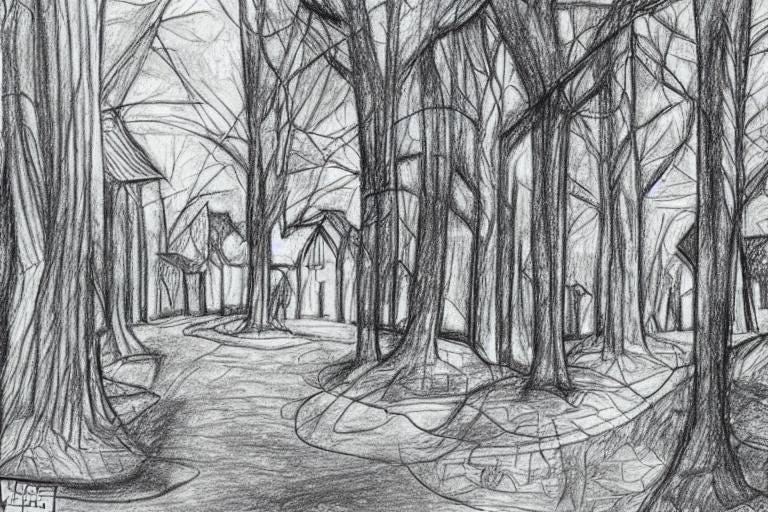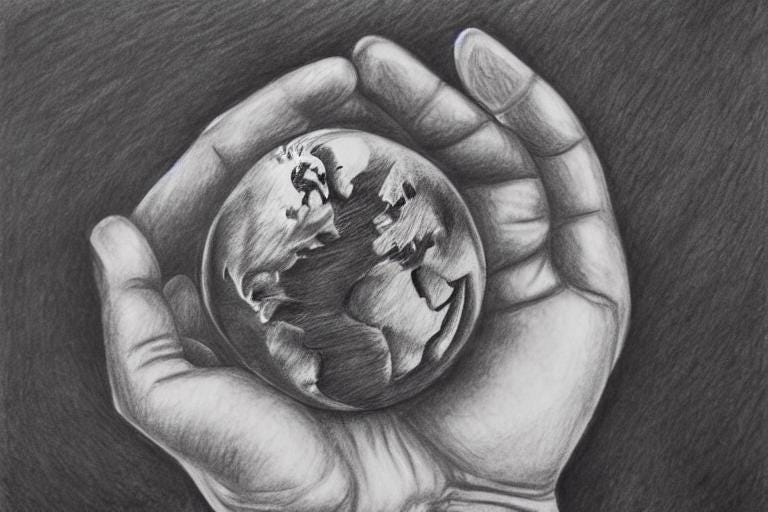Thinking the Planet
The Original Question
What is the planet? I have no idea how people understood the Earth before the 15th century1 when it was the center of the [[universe]] but the memory of those experiences has faded away. For us, the Earth is always the third planet from the sun. We can't turn the clock back, and who wants to be the center of the universe anyway! , but we need to revive the planet that is the Earth, our only home, and yet is a planet, a being that houses us and many other beings.
But why bother? Why think the planet and what will that thinking do that IPCC reports and servers full of earth systems data can't?
One answer: because. Because it's there, because it's impossible for us to not have that thought in our current condition, because it's good to grasp the whole before poking its parts. Because.
But also because thinking the planet will help us create new, much needed institutions. Let's take ourselves back to the seventeenth and eighteenth centuries. Kings were ruling everywhere and while they hadn't done so for ever, no one had any other experience of political life. Republics were the exception. European colonization of the Americas was deepening. Slaves were being transported across the oceans.
A new kind of interconnectivity was emerging. Around that time, a thought emerged: that of the "people," of a political collective that had never existed before. What is this "people"? Sometimes we conceive of the people as a population, a measurable quantity with per capita income and average lifespan. Sometimes we conceive of the people as a mass, an amoeba like force that can topple rulers. That phrase has become a hub for so many analogies and metaphors that whatever we thought about it at the beginning was soon overshadowed by new meanings of the term.
What's important is that a certain kind of transcendental thought becomes possible. Of the people. Once that thought is released into the world, it can make demands. Such as: the people are sovereign. Not the king. Not the aristocracy, but the people. Immediately, another question arises: how will the people rule themselves? It's easy to imagine the king ruling a territory: there's this individual person who makes a decision that's filtered through a chain of command. That's what CEOs and other bosses do to this day.
What does it mean for the people to be sovereign? How do they rule? It's a design problem that prompts the evolution of voting systems and secret ballots and jury design and any number of other interventions. But first, one must have that thought: "people." Just as it is for us. We must have that thought: "planet." How will that planet govern itself? How will the lion feel about being told not to eat the antelope? How will the antelope feel about not eating the grass? Seems mindbogglingly alien to us. But at least we can have that thought: "planet." That's a beginning.
Society and Ecology
As we keep thinking that thought, it prompts another trip into the universe, but this time not by viewing it from infinity like a distant god, but by working our way with the other beings who inhabit the Earth. We need to express solidarity with the other beings on this planet before we set out for other worlds.
So how do we grasp the planet from the inside?
Our mode of grasping will be to trace lines of connection from being to being. But not every being for 'Everything is Connected' doesn’t do it for us. We will have to restrict our connections judiciously. When Kant started his famous Critique of Pure Reason, he framed his project in a deliberately constrained manner: on the one hand the province of reason included everything and anything that could be grounded in experience and on the other hand (despite the inherent tendency of reason to do so) it excluded anything and everything that had no connection whatsoever with experience, like questions about the Soul or God.
We have to play a version of the same game.
How we grasp the planet
Our grasping of the planet includes everything and anything on this earth, however great or small, but it excludes anything and everything beyond, however important. The criterion of inclusion and exclusion isn't potential experience but common fate, the dictionary of beings whom we associate . It is the sphere of the social in the way that Latour uses the term2. But we might equally well call it the sphere of the ecological - both terms refer to spaces of connection. Which term we use might depend on which route we are taking: from the biosphere inwards to society or from society outwards to the biosphere.
What are we grasping?
This planet is subject and object and everything in between.
Why subject?
Because it is the condition of possibility for our existence, and in particular our capacity to grasp the world presupposes the planet. It is the true transcendental subject in the Kantian sense of that term. Of course it's an object that can be studied using a plethora of scientific instruments.
The planet is, in the deepest sense of that term, a world of worlds.
So let me end with a digression on worlds and how it’s possible to grasp one.
How is Grasping Possible in the First Place?
We take for granted that the world makes sense. You open your eyes and a scene presents itself in front of you. There's a little coffee cup a foot to your right; it's easy to take your right hand off the keyboard, grab the cup, smell the aroma of fresh ground beans and taste the hot liquid as it flows on to your tongue and descends down your throat.
Easy peasy. It's like that every single day you're alive. Every once in a while this ease of being fails, like when you run into a transparent window thinking there's air when there's glass. It's a bigger problem for birds than for us but we are susceptible to the illusion too. Glass houses aside, illusions are scarce. We mostly see what we hear, touch what we see, tell people about what we have touched and sleep assured that all's well with the world. While you might enjoy the Matrix so much that you have seen it seven times, there's no convincing you that the world in which you wake up every morning is an illusion. In fact, it's the very definition of what's not an illusion.
All of which because it makes complete, total and coherent sense. In fact, we trust our sense-making so much that we are willing to accept gaps between appearance and reality - the sun only appears to revolve around the earth; in reality it's the other way around. If there was only appearance, then the question of a revolution in sense-making wouldn't even arise. Since the world makes sense, it will reveal the truth behind the appearances if you look close enough. And so we refine our instruments, build bigger telescopes and microscopes and look every more closely.
At some point, however, the gaze turns inward. As the world makes more and more sense, it's natural to ask what is it that constitutes sense-making. Probing one step further, two questions arise:
1. How do we make sense of the world?
2. Why does it make sense at all?
Conceptual progress depends on close integration of why questions with how answers but the situation is quite lopsided. Understanding how we see or smell the world is hard, but we have made enormous progress - after all, it's the basis for common sense as well as all of science. You see water on your pavement and you conclude that it must have rained overnight. Or you're upset at your neighbor for not spraying water everywhere. Or you see a photograph in a cloud chamber and conclude that it must be the particle you've been looking for several years. We express the how of sense-making in the language of data, evidence, inference, neural pathways and information processing.
But why does it make sense at all? Why is it not a confusion?
Karmadata
So what is this planetary thought?
Perhaps it's a series of thoughts bound by a common orientation.
The first thought is spatial - to cast a net on the earth and say that everything trapped in that net is a matter of concern to us. Which is to say, everything. It's a little bit more than space actually. There's some placing involved and some identification involved. Imagine a planetary google that can reach into the heart of every living being, a unique address for that barnacle and this sponge and that redwood and this mouse. So like the famous mappers of that Borges story, we want a catalog of the earth that's coterminous with the earth. Sounds ominous and it might well be - who wants to be tracked every second of their lives?
But the flip side is: without tracking and accounting, how will we know if you have been harmed or not? I mean, how do you apply for health insurance today if you aren't willing to tell the state and the hospitals about your symptoms? There's no welfare without surveillance. It's just a fact. In the liberal order, control penetrated into the lives of its citizens but it also came with freedoms. There was a creation of an individual consciousness which was outside the realm of control, a protected space which couldn't be touched.
The totalitarians didn't respect that decision; they wanted to dictate how you should think. But to be frank, what could they dictate? Loyalty to the regime. Or spying upon one's neighbors. But that brute force attempt is crude in comparison with our computationally driven capacities for control, where swirling streams of data shape our thoughts. Today, our streams of consciousness are exposed to the system every second and so there's absolutely no hope of an individual self in possession of those thoughts. It may turn out that the liberal individual is just a temporary phase of our political history. The new control system isn't a panopticon, for it can't see anything - it simply doesn't have the stability to be an all seeing eye, for it's unity is as fluid as ours; just as we aren't unified selves with protected internal consciousness.
Then there's the additional realization: doesn't this cosmic accounting already have a name? It's karma isn't it?
I am sure there are intellectual historians who can help me grasp this better but I am being lazy. The transformation in consciousness doesn't interest me as much as where we are today.
In due course, the social might depart the earth and travel to other worlds, but we have so little experience extending the social beyond the human that it's foolish to think we should leap ahead and start socializing Venus and Mars.








